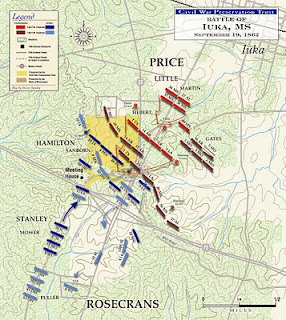General Rosecrans says (" Official Records," Vol. XVII. Pt. I. p. 74) that " we moved from Jacinto at 5 A. M. with 9000 men, on Price's forces at Iuka. After a march of 18 miles attacked them at 4:30 P.M. . . . with less than half our forces in action." Meanwhile the command of General E.O.C. Ord, comprising the divisions of Davies, Ross, and McArthur, numbering about 8000 men, was marching from Corinth direct on Iuka, and was within four or five miles of the battle-field on the 19th (see map, p. 730). The entire Union force near Iuka, including Ord, was about 17,000 men.
Conspicuous in the battle was the 11th Ohio Battery:
"When the Eleventh went into position Lieutenant Sears was in command. As junior First Lieutenant, I had the right section, while Second Lieutenant Alger fought the center section. Of the acting Second Lieutenants Perrine had the left section and Bauer the line of caissons. During the fight I succeeded to the command when Sears went to the rear with a wound. Alger was captured. Bauer was killed.
The battery had taken position in line from column under an infantry fire from an entire division at ranges of from 200 to 400 yards. Shells from the rebel artillery were also crashing through our line. We opened fire at first with shell. This shell fire proved so effective that a rebel assault on the battery was ordered. A division of Price’s army rushed to the charge. The battery changed from shell to double charges of canister. The effect of the canister was[Pg 9] terribly increased because of the rebel method of charging in masses. Had the line to the left of the battery held its front the assault on the battery would have been impossible of success. But Col. Eddy of the 48th Indiana was killed and the survivors of his regiment were swept back by overwhelming numbers. The left flank of the battery was thus left bare and unsupported. On the right the Fifth Iowa was cut to pieces. Only eleven officers and a handful of men remained. With the line melted away the battery found itself facing in three directions and battling with masses on three fronts. It had a rear but no flanks. The guns were being worked with greater speed and smaller crews. Cannoneers were falling. Other cannoneers coolly took their places and performed double duty. Drivers left their dead horses and took the places of dead or wounded comrades, only to be struck down in turn. Of eighty horses only three remained standing and a withdrawal of the guns was impossible. The surviving men were too few to do more than work the guns. Finally the charging hordes, checked and mutilated again and again in front, to right and to left, pressed close. Eight thousand men against two score. On the fifth charge the survivors were finally choked from the guns they would not abandon."
A Battery at Close Quarters Pg.9 Henry M. Neil 1909
Battle of Iuka on September 19th.
(Click the Pic)

Ord was late for the battle after a miserable march:
ReplyDeleteAnxious to start even before he heard Rosecran's proposal, Grant had written General Ord on the afternoon of September 17: "We will get off all our forces now as rapidly as practicable. I have dispatched Rosecrans that all our movements now would be as rapid as compatible with prudence." Ord was to come on to Glendale before dusk, there to be ready to board trains for Burnsville at dawn on September 18.
Despite a torrential rain that fell all day, Ord reached Glendale as planned. Cyrus Boyd of the Fifteenth Iowa marveled at the misery the men endured on the march. "Have traveled all day and toward all points of the compass and the rain has poured down all the time turning the dust all to mud," he complained to his diary. "We are wet to the hide and the air is very cold. We made up a fire in some old pine logs and stayed up most of the night drying our clothes and keeping warm." All night long the rain came down, pounding the roads to paste.
It was an inauspicious beginning to a movement that demanded rigid adherence to a timetable."
The Darkest Days of the War pg.65 by Peter Cozzens